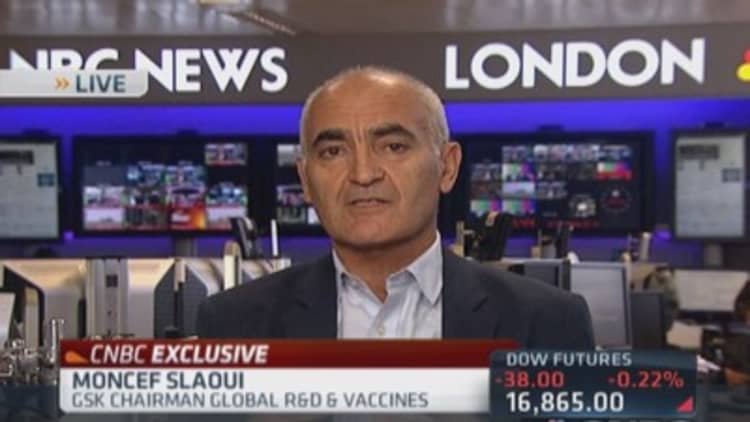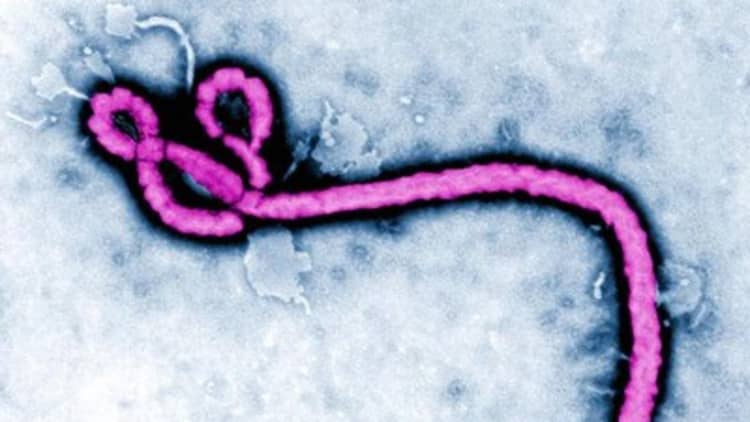
GlaxoSmithKline is speeding up trials and scaling production of an Ebola vaccine, but does not expect to be able to make it in mass quantities for 12 to 18 months, Dr. Moncef Slaoui, chairman of research and development at the U.K. pharmaceutical giant, said Tuesday on CNBC. That's even before there's any consideration of when it might potentially be available for use, he said.
Usually, it takes 10 to 30 years from the idea stage until approval for human use, Slaoui told "Squawk Box." In this case, Glaxo is working to significantly compress that time frame. But he won't project as to when it may be ready to be released.
On Monday, a nurse in Spain become the first person in the latest outbreak known to have contracted Ebola outside of West Africa. Three other people, including the patient's husband, were being monitored for the virus.
Read MoreFour people monitored in Spain for Ebola
"Normally, we need data from thousands, if not tens of thousands of healthy volunteers before we can make a vaccine available," said Slaoui. "In this particular setting … we will need data from perhaps several hundred maybe a thousand volunteers."
Even if the latest Ebola epidemic subsides, like in past outbreaks, he said Glaxo is committed to making this vaccine at industrial scale for the West African countries that need it and possibly other nations should the virus spread. Slaoui pointed to Glaxo's persistence over three decades to discover and develop a malaria vaccine that's in the approval process.
Meanwhile, many small biotech companies are working on treatments for Ebola, including Chimerix, which announced that its drug has been approved for emergency use in Ebola patients. Thomas Eric Duncan, the patient with the virus in Dallas, was being given the antiviral treatment.
Duncan, who's in critical condition, became the first Ebola patient in the U.S. last month. He was initially sent home by Texas Health Presbyterian Hospital before later being diagnosed with the virus and put in isolation. Dozens of people he came into contact with since arriving from Liberia on Sept. 20 are being monitored by health officials.
Read MoreTimeline: How Ebola Made Its Way to the U.S.
The cleanup of Duncan's apartment has also been far from smooth as red tape and arguments over procedure held up the work, which finally began on Friday, five days after his Sept. 28 admission to the hospital.

The problems diagnosing Duncan, isolating him and cleaning up his environment were surprising, the CEO of Mount Sinai Health Systems, which this summer had its own Ebola scare, told CNBC on Tuesday.
"I'm kind of flabbergasted with some of the issues that went on with that chain of dirt they had to get rid of," Dr. Kenneth Davis said in a "Squawk Box" interview, referring to the cleanup efforts.
To help avoid the issues experienced in Dallas, Mount Sinai of New York City recently sent an actor with mock Ebola symptoms into its emergency room to test triage personnel on their ability to identify and isolate possible cases.
"A few days ago, we had a 'secret shopper' who came into our hospital ... so we could check that everybody is doing the right thing," said Davis, adding that the hospital staff then had a debriefing on the drill.
Read More
In August, the first of the potential Ebola patients at Mount Sinai was admitted with symptoms consistent with the virus after traveling in West Africa. He was put into isolation 11 minutes after it become clear he might be infected, Davis recalled. The patient later tested negative.
To date, the hospital has properly dealt with four more possible Ebola cases that all turned out negative, he said Tuesday. "If a hospital is prepared, has drilled, has the right equipment, it's easy to handle this problem."


